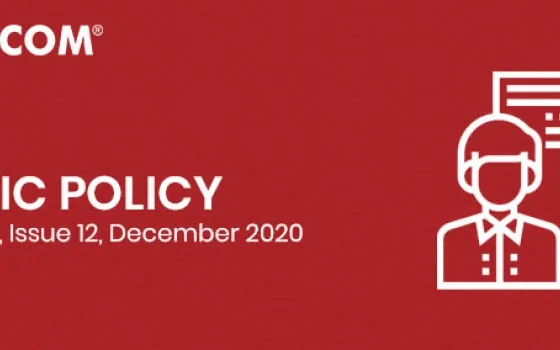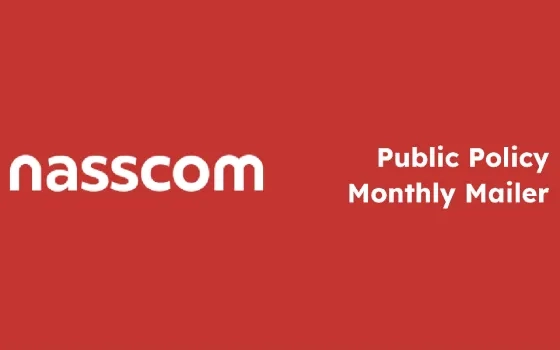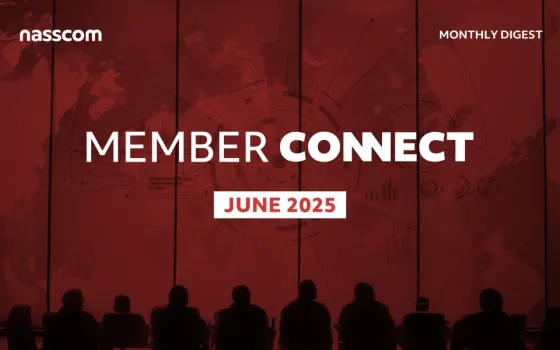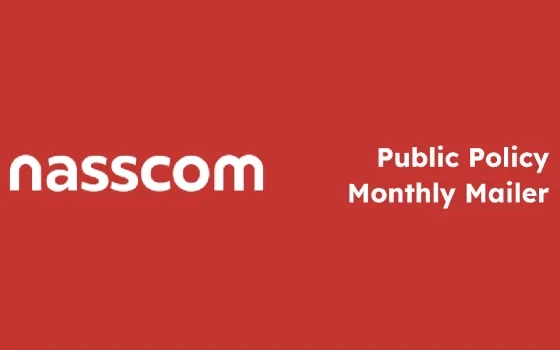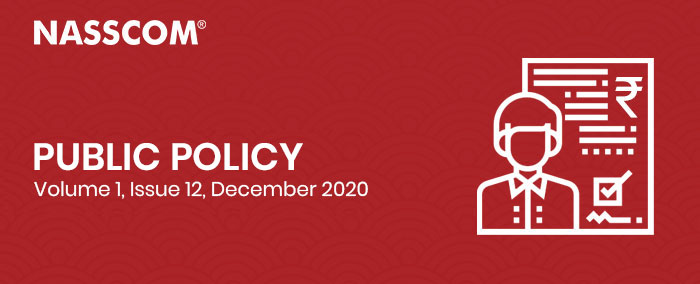 |
| |
| In Focus |
| |
 |
| |
|
| |
| |
| |
| |
 |
|
Exports Competitiveness: Interaction with the Union Commerce Minister |
|
| |
| |
|
|
 |
|
| |
| |
|
|
On 24.11.2020 NASSCOM participated in an interaction with Shri Piyush Goyal to discuss the status of economic recovery and measures needed to boost the same. As part of our key suggestions, we reiterated the need for relaxations and clarifications with respect to the SEZs so as to enable long term remote working. The minister assured us that the Department of Commerce is working on the matter. We also discussed industry’s concerns on the recent Haryana job reservation Bill, ongoing concerns around taxation of ITES exports under GST and the need for clarity on the Service Exports from India Scheme (SEIS) with respect to the last financial year and the way forward. |
|
| |
|
| |
|
|
|
| |
| Submissions and Representations |
| |
 |
| |
|
| |
| |
| |
| |
 |
|
Ministry of Finance: NASSCOM’s suggestions for Union Budget 2021-22 |
|
| |
| |
|
|
 |
|
| |
| |
|
|
NASSCOM submitted a detailed memorandum of suggestions for the Union Budget 2021-22 to Ministry of Finance on 06.11.2020. Given the significant impact of the novel coronavirus (COVID-19) on the Information Technology – Business Process Management (IT-BPM) industry, our suggestions focussed on measures to improve ease of doing business to help boost recovery of the tech industry including E-commerce companies and Start-ups. We have also suggested few fiscal measures relating to investment promotion and export competitiveness (read more). |
|
| |
|
| |
| |
| |
 |
|
GST: Submission seeking deferment of B2C dynamic QR code |
|
| |
| |
|
|
 |
|
| |
| |
|
|
Sixth proviso to Rule 46 of Central Goods and Services Tax Rules, 2017 empowers the Government to notify requirement of a Quick Response (QR) code on the invoice. However, it is unclear as to the intent behind introduction of this requirement and what would be the contents of the dynamic QR. In this regard, we have made a representation to GST Council and GST Policy Wing on 20.11.2020 requesting for deferment of applicability of dynamic QR Code for B2C invoices to 01.03.2021 and for clarifying the applicability and contents of the dynamic QR code (read more). In response to our recommendation, Central Board of Indirect Taxes and Customs (CBIC) issued a notification on 29.11.2020 deferring implementation of Dynamic QR Code till 31.03. 2021 (read more). |
|
| |
|
| |
| |
| |
 |
|
MCA: Submission requesting for amendment in provisions requiring Independent Directors to pass online proficiency self-assessment test |
|
| |
| |
|
|
 |
|
| |
| |
|
|
NASSCOM made a submission to Ministry of Corporate Affairs (MCA) highlighting concerns relating to the provisions of Companies Act, 2013 that requires every individual who is appointed as independent director to pass an online proficiency self-assessment test conducted by Indian Institute of Corporate Affairs (IICA) within a prescribed period, failing which, the name is removed from the databank. In our submission, we suggested instead of a proficiency test, MCA should consider introducing a credit hour’s system and conduct training programs for independent directors on a periodic basis which will help them to keep informed about regulatory changes (read more). |
|
| |
|
| |
| |
| |
 |
|
Ministry of Finance: Feedback on OECD Pillar One Blueprint |
|
| |
| |
|
|
 |
|
| |
| |
|
|
In September 2020, Tax challenges of digitalisation of economy were identified as one of the focus areas of the Base Erosion and Profit Shifting (BEPS) Action Plan. Based on inputs from Industry, NASSCOM submitted its preliminary feedback on the Organisation for Economic Co-operation and Development (OECD) Pillar One Report to Ministry of Finance (MOF) on 20.11.2020. As part of our feedback, we have suggested that Pillar One proposals on a net income basis may be retained with modifications towards simplicity and a safe harbour, that is an alternative proposal, that provides for gross income taxation on a creditable basis may be provided for as an additional option. This would enable a smooth transition from Equalisation Levy, by making it creditable under a new multilateral instrument (to eliminate double taxation), and yet easy to administer on account of it being charged on a gross income basis (read more). Subsequently, we met the MoF officials and discussed our feedback. We further suggested that MoF should engaged with OECD and ensure non- applicability of Pillar One on B2B ITeS transactions. |
|
| |
|
| |
| |
| |
 |
|
TRAI: Feedback on ‘Unbundling of Differential Layers Through Differential Licensing’ consultation |
|
| |
| |
|
|
 |
|
| |
| |
|
|
NASSCOM submitted its response to the consultation paper issued by Telecom Regulatory Authority of India (TRAI) on ‘Unbundling of differential layer through differential licensing’. In our response, we recommended the need to unbundle the Unified License (UL) into separate licensing regime to bring in greater competition at various layers. Currently, only one UL is required to procure network, infrastructure, and provide all telecom services. We further stated that any regulatory framework for the service layer should not attract a high compliance cost which will be detrimental to the growth of the industry (read more). |
|
| |
|
| |
| |
| |
 |
|
TRAI: Feedback on ‘Enhancing Broadband Connectivity and Enhanced Broadband Speed’ consultation |
|
| |
| |
|
|
 |
|
| |
| |
|
|
NASSCOM submitted its response to the consultation paper issued by TRAI on ‘Roadmap to Promote Broadband Connectivity and Enhanced Broadband Speed’. In our response, we recommended the need to redefine the definition of Broadband and to improve the telecom infrastructure to meet the growing demand of the internet connectivity in the country. We also highlighted universal broadband internet access should be treated as a public service in the lines of other infrastructure services such as highways and roads, railways, water and electricity etc. where the State should proactively encourage and facilitate penetration and universal availability (read more). |
|
| |
|
| |
| |
| |
 |
|
Ministry of Labour and Employment: Submission on Draft Industrial Relations (Central) Rules 2020 |
|
| |
| |
|
|
 |
|
| |
| |
|
|
NASSCOM submitted its feedback on the Draft Industrial Relations (Central) Rules, 2020 which were earlier published by the Ministry of Labour and Employment (details available here). Our key suggestions pertained to functioning of Grievance Redressal Committee and Bi-Partite Forums. We also suggested that period of raising any dispute should be reduce to three months as against one year which is currently being proposed. Similarly, we suggested that timeline for depositing money towards workers reskilling funds should be increase to 30 days as against 10 days as proposed under the Draft rules. |
|
| |
|
| |
| |
| |
 |
|
MeitY: Submission on Draft Data Centre Policy to MeitY |
|
| |
| |
|
|
 |
|
| |
| |
|
|
Ministry of Electronics and Information Technology (MeitY), on 05.11.2020, released the draft Data Centre Policy for public feedback (more details here). The draft proposes fiscal incentives to attract investment in the sector and includes various measures aimed at creating a favourable ecosystem for the operations of Data Centres in India. The draft also includes most of the recommendations made by NASSCOM in May 2020. NASSCOM, based on inputs received from the members, has submitted its feedback to the Ministry (read more). |
|
| |
|
| |
| |
| |
 |
|
DGFT: Additional inputs for Foreign Trade Policy (2015-2020) Review |
|
| |
| |
|
|
 |
|
| |
| |
|
|
The Directorate General of Foreign Trade (DGFT) has invited inputs from the industry for the review of Foreign Trade Policy 2015 – 2020 (read more). Foreign Trade Policy is the governing document for all import and export policies of India. NASSCOM has submitted a response to the DGFT, giving inputs in addition to what has been captured in our previous submission which was made in September 2019 after extensive consultation with the industry Some of the suggestions made in our submission include, suggestions for establishing a new mechanism for SCOMET authorization revalidations, placing focus on e-commerce exports under various FTP schemes, enabling work from home for SEZ units etc. (read more). |
|
| |
|
| |
| |
| |
 |
|
NITI Aayog: Feedback on Online Dispute Resolution (ODR) policy plan for India |
|
| |
| |
|
|
 |
|
| |
| |
|
|
NITI Aayog released a draft discussion paper titled “Designing the Future of Dispute Resolution: The ODR Policy Plan for India” (ODR Paper), in October 2020. The ODR paper makes several recommendations for better implementation and scaling up of ODR in India. On 11.11.2020, NASSCOM submitted feedback on the ODR Paper. In our submission, we have highlighted the need for undertaking a mapping exercise to identify sectors for prioritising onboarding of ODR and developing a clear action plan for the implementation of three aspects of onboarding technology in dispute resolution, i.e. transforming processes online, creation of alternative modes of pre-court dispute resolution and reducing disputes (read more). |
|
| |
|
| |
| |
| |
 |
|
NITI Aayog: Feedback on draft discussion paper on DEPA |
|
| |
| |
|
|
 |
|
| |
| |
|
|
NITI Aayog released a draft discussion paper titled ‘Data Empowerment and Protection Architecture’ (DEPA), in August 2020. DEPA aims at empowering individuals with control over their data and enables people to seamlessly and securely access their data and share it with third party institutions. Based on extensive inputs from the industry, NASSCOM submitted a detailed response to the draft discussion paper. In our submission, we included several points which will aid in improvement of the DEPA framework, such as, clarifying the liability of various stakeholders, enabling participation by more entities, ensuring sharing high-quality data, envisaging Data Protection Authority (as proposed under the Personal Data Protection Bill) as the lead regulator for DEPA in addition to sectoral regulators (read more). |
|
| |
|
| |
|
|
|
|
|
| |
| |
| |
| |
| |
 |
|
Diesel Generators Ban: Meeting with Govt. of Uttar Pradesh |
|
| |
| |
|
|
 |
|
| |
| |
|
|
The Environment Pollution (Protection and Control) Authority (EPCA) had directed the State/UT Governments of NCR to ban usage of Diesel Generators for purposes that are not specifically exempted from 15.10.2020. Given the implication of this measure, NASSCOM made representation to the Government of Uttar Pradesh. On 2.11.2020, NASSCOM, along with industry representatives, had a meeting with Additional Chief Secretary-IT, Uttar Pradesh. The State Government has assured continuous power supply to ensure that IT-BPM companies do not have a need for secondary source of power. |
|
| |
|
| |
|
|
| |
| |
| |
 |
|
Data Centre Policy: Interaction with Uttar Pradesh State Government |
|
| |
| |
|
|
 |
|
| |
| |
|
|
The Department of IT & Electronics, Government of Uttar Pradesh (GoUP), on 20.11.2020, had organised an industry consultation to discuss the draft UP Data Centre Policy under the chairmanship of Infrastructure and Industrial Development Commissioner (IIDC) GoUP, along with Additional Chief Secretary (ACS)- Dept. IT & Electronics, GoUP. The State Government had considered NASSCOM recommendations to MeitY on Data Centres, in the formulation of draft policy. NASSCOM participated in the meeting and shared its view on the proposals and submitted written feedback post the interaction (read more). |
|
| |
|
| |
|
|
| |
| |
| |
 |
|
Data Centre Policy: Interaction with Maharashtra State Government |
|
| |
| |
|
|
 |
|
| |
| |
|
|
The Department of Information Technology, Maharashtra had organised a meeting on 12.11.2020, to discuss the draft Data Centre Policy published by MeitY. NASSCOM participated in the interaction and shared its views on the proposals and subsequently, a written submission was made. In our submission, NASSCOM suggested to promote use of Natural Gas in Data Centres, introduction of deemed approval system for regulatory clearances and not mandating any specific technical Standards for Data Centres (read more). |
|
| |
|
| |
|
|
| |
| |
| |
 |
|
DPIIT: Meeting on key issues in e-Commerce under the India-Singapore CECA |
|
| |
| |
|
|
 |
|
| |
| |
|
|
On 3.11.2020 NASSCOM submitted its inputs on key issues that need to be addressed in the context of the India-Singapore Comprehensive Economic Cooperation Agreement (CECA), from the perspective of the e-Commerce industry. In its submission, NASSCOM highlighted the importance of easing mobility issues for the e-Commerce and IT services industry, particularly relating to the issuance of Employment Passes by the Singapore Government. Further, the need for ensuring sustained and secure cross border transfers through the introduction of appropriate chapters under the CECA was also highlighted, alongside the need for sustained forbearance from the imposition of customs duties on electronic transmissions and ensuring the implementation of provisions relating to paperless trading under the CECA. |
|
| |
|
| |
|
|
| |
| |
| |
 |
|
Standing Orders: Meeting with Ministry of Labour and Employment |
|
| |
| |
|
|
 |
|
| |
| |
|
|
NASSCOM participated in a series of discussions with the labour ministry on the issue related to the applicability of Standing Order (SO) provisions under the IR code on the IT sector. In the meeting we stressed on the need for exemptions from SO provisions for the IT-ITeS companies to ease the compliance burden and for the growth and development of the IT sector. We further highlighted the need for Government to consider framing different standing orders for different industries based on their needs and requirements. |
|
| |
|
| |
|
|
| |
| |
| |
 |
|
NASSCOM 10,000 Start-ups: India Fintech Day CXO Round Table on Next Normal for BFSI |
|
| |
| |
|
|
 |
|
| |
| |
|
|
The policy roundtable had participation from banking, insurance, payments, lending and crypto trading segments. The industry leaders represented global as well as domestic banks and insurance companies, Start-ups and Global Capability Centres (GCCs). The discussions focussed on the technology led response to overcome the ongoing Covid-19 pandemic led challenges. Overall, the participants felt that the crisis has helped accelerate technology adoption and innovation and this has enabled the industry steer towards recovery and growth. Some of the policy areas highlighted included the need to enable long term remote working in SEZs, lack of enabling ecosystem for crypto industry and the need for measures to boost insurance penetration. |
|
| |
|
| |
|
|
| |
| |
| |
 |
|
NPCI: Discussion on UPI volume cap introduced for Third Party App Providers (TPAPs) |
|
| |
| |
|
|
 |
|
| |
| |
|
|
On 9.11.2020, NASSCOM organised an e-meeting to discuss the implications of the circular issued by National Payments Corporation of India (NPCI), which introduced Unified Payments Interface (UPI) volume cap for Third Party App Providers (TPAPs). The meeting was attended by senior representatives from industry. |
|
| |
|
| |
|
|
| |
| |
| |
 |
|
E-commerce: First meeting of the Special Interest Group |
|
| |
| |
|
|
 |
|
| |
| |
|
|
On 25.12.2020, NASSCOM organized the first meeting of the Special Interest Group on e-Commerce (SIG). The SIG has been formed as a thought leadership forum to build a narrative on the impact of e-Commerce in India and develop a shared understanding of emerging trends and risks. The SIG envisages focus on holistic development of the e-Commerce ecosystem. For more information or for being part of the SIG, kindly write to garima@nasscom.in. |
|
| |
|
| |
|
|
|
|
|
| |
| |
| |
| |
 |
|
Request for inputs: SEBI Consultation Paper on the applicability and role of risk management |
|
| |
| |
|
|
 |
|
| |
| |
|
|
Securities and Exchange Board of India (SEBI) has recently released a discussion paper to solicit public comments on proposed amendments to SEBI (Listing Obligations and Disclosure Requirements) Regulations, 2015 regarding the applicability and role of the risk management committee. In this regard, we request you to send your inputs/ views on the proposed amendments before 7.12.2020 to tejasvi@nasscom.in (read more). |
|
| |
|
| |
| |
| |
 |
|
Request for inputs: Amendments to Copyright Act, 1957: Deadline Extended |
|
| |
| |
|
|
 |
|
| |
| |
|
|
This is with reference to our earlier call for inputs (available here), kindly note the deadline for sending inputs to The Copyright Act, 1957 has now been extended by the Government till 30.12.2020. You are requested to kindly send your suggestions/ inputs on the same latest by 15.12.2020 per the format (available here). Kindly email your feedback to deepak@nasscom.in, indrajeet@nasscom.in and tejasvi@nasscom.in. |
|
| |
|
| |
| |
| |
 |
|
Request for inputs: NITI Aayog working document on Enforcement Mechanism for Responsible AI |
|
| |
| |
|
|
 |
|
| |
| |
|
|
NITI Aayog has released a working document titled Enforcement Mechanism Responsible #AIforAll for public comments on 18.11.2020. The document recognises that risks from AI systems vary with context and use case and suggests that a flexible risk approach be adopted to manage risks. The deadline for sending inputs to NITI Aayog is 15.12.2020. Please share your inputs with komal@nasscom.in and jayakumar@nasscom.in latest by 7.12.2020 (read more). |
|
| |
|
| |
| |
| |
 |
|
Request for inputs: Draft Social Security (Central) Rules, 2020 |
|
| |
| |
|
|
 |
|
| |
| |
|
|
The Ministry of labour and employment has published the Draft Social Security (Central) Rules, 2020 (Rules) for stakeholders feedback. The Rules prescribes for procedure for the administration of social security schemes and funds including manner of administration of Central Board and Employees State Insurance Corporation (ESIC) and National Social Security Board for unorganised workers etc. The deadline for sending inputs to the Govt is 28.12.2020. Kindly share your inputs with deepak@nasscom.in latest by 15.12.2020 (read more). |
|
| |
|
| |
| |
| |
 |
|
Request for inputs: Draft Occupational Health, Safety and Working Conditions (Central) Rules, 2020 |
|
| |
| |
|
|
 |
|
| |
| |
|
|
The labour ministry has published the draft Occupational Safety, Health and Working Conditions (Central) Rules 2020 (Rules). The Rules are applicable to every establishments in which 10 or more workers are employed. The rules lay down the process of registration for an establishment under the Code on Occupational Safety, Health and Working Conditions 2020. Daily working hours for a worker has been fixed as eight hours, with a weekly time limit of forty-eight hours. The deadline for sending inputs to the Govt is 03.01.2021. Kindly share your inputs with deepak@nasscom.in latest by 20.12.2020 (read more). |
|
| |
|
| |
| |
| |
 |
|
Webinar: New OSP Guidelines |
|
| |
| |
|
|
 |
|
| |
| |
|
|
NASSCOM will be organising a webinar on the new Other Service Provider (OSP) guidelines that were released by the Department of Telecommunications (DoT) in December month to discuss the key changes that have been brought under the regime and its impact on the IT industry. For further details on the event and registration, kindly write to deepak@nasscom.in. |
|
| |
|
| |
| |
| |
 |
|
NASSCOM-DSCI Policy Roundtable: Assessing the Future of EU-India Data Flows in the aftermath of Schrems-II |
|
| |
| |
|
|
 |
|
| |
| |
|
|
NASSCOM and DSCI will be organising an online policy roundtable on assessing the future of EU-India Data Flows in the aftermath of the decision of the Court of Justice of the European Union (CJEU) in the case of Data Protection Commissioner v. Facebook Ireland Ltd., Maximilian Schrems (Schrems II) invalidated the US-EU Privacy Shield and led to wide-reaching ramifications in terms of cross-border data transfers outside the EU. For further details on the event and registration, kindly write to indrajeet@nasscom.in and anand.krishnan@dsci.in. |
|
| |
|
| |
| |
| |
 |
|
Engaging with the government for policy issues important for start-ups |
|
| |
| |
|
|
 |
|
| |
| |
|
|
NASSCOM is in the process of creating an action plan for the coming year 2021 for engaging with the relevant government departments on policy issues important for start-ups. As India grows as a start-up hub, it is important to drive forward policy issues that will benefit the start-up ecosystem. In this context, NASSCOM invites suggestions and inputs from start-ups on an ongoing basis, focusing on start-ups related policy issues, such as, app-store policy, competition in digital markets, access to capital, taxation of employee stock options, listing of Indian start-ups etc. For more information, please write to garima@nasscom.in. |
|
| |
|
| |
|
|
|
|
|
| |
| |
| |
| |
 |
|
DoT: New OSP Guidelines 2020 |
|
| |
| |
|
|
 |
|
| |
| |
|
|
The Department of Telecommunications (DoT) on 5.11.2020 released a New Other Service Providers (OSPs) Guidelines (Guidelines). The new guidelines supersede the earlier OSP Terms and Conditions, which were introduced more than a decade earlier. The new guidelines provide much needed breather from the onerous compliances and interpretational issues which caused lot of practical and operational challenges for the IT-BPM Industry in the earlier regime. The new guidelines are simple and based on the principle of trust and self-regulation. With the new guidelines, the requirement of OSP registration has been done away with completely. Further, the guidelines are now limited to entities that are providing voice based BPO services. The data and internet driven entities are now been kept outside of the scope of OSP regime.
Further, the requirement of providing network diagrams which was there in the earlier regime has also been done away with. Another significant development is relating to the provisions relating to work from home. Under the new guidelines, the Government has removed the requirement of furnishing Bank Guarantee which was earlier required for the purpose of work from home and sharing of infrastructure. Furthermore, new guidelines also acknowledge the concept for working from anywhere in India and do not restrict agent to work or login from a particular location, something which was not possible in the erstwhile regime.
|
|
| |
|
| |
| |
| |
 |
|
IFSCA: The International Financial Services Centres Authority (Global In-House Centres) Regulations, 2020 |
|
| |
| |
|
|
 |
|
| |
| |
|
|
On 12.11.2020, the International Financial Services Centres Authority (IFSCA) notified its Global In-House Centres (GIC) Regulations to provide a framework for recognition and operation of GlCs. The regulations enable multinational companies (MNCs) to set up GICs in GIFT City, Gandhinagar for outsourced business functions while leveraging the benefits of cost savings accompanied by improved productivity and high-quality service (read more). |
|
| |
|
| |
| |
| |
 |
|
GST: Update on E-invoicing by CBIC & GSTIN |
|
| |
| |
|
|
 |
|
| |
| |
|
|
Certain set of taxpayers (having aggregate turnover exceeding INR 500Crores) had started e-invoicing from 01.10. 2020. In the month of October 2020, about 4.95 Crore invoices were generated by 27400 GSTINs. Government has now clarified that effective 01.01 2021, GST e-invoicing is mandated for all the taxpayers with aggregate turnover exceeding Rs. 100 Cr (in any preceding financial year from 2017-18 onwards). In this regard, the Central Board of Indirect Taxes (CBIC) and Goods and Services Tax Network (GSTN) have updated FAQs published on their website (read more). |
|
| |
|
| |
|
|
|
| |
|
|



